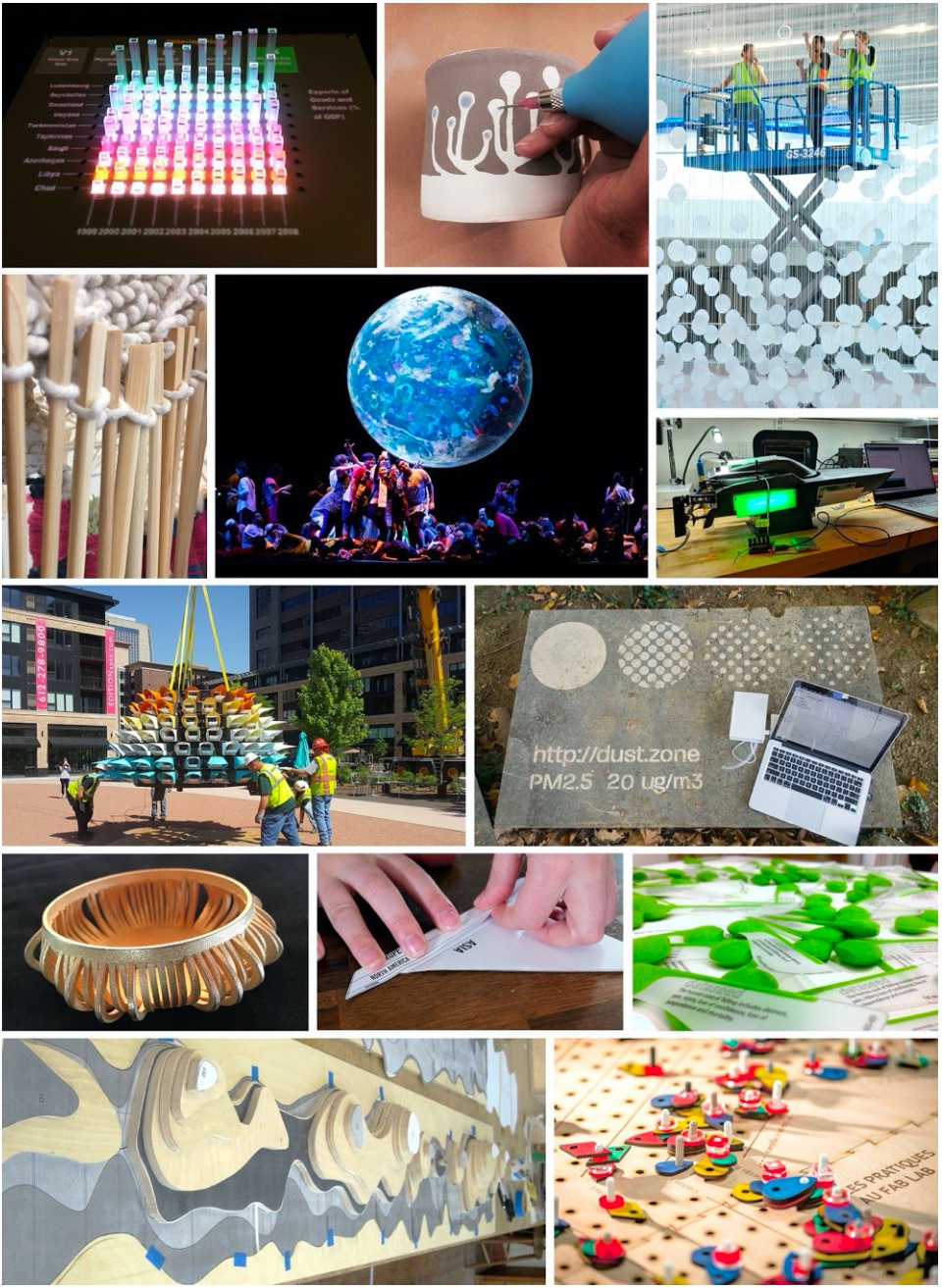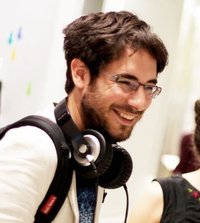
The Project
Humans have created physical representations of quantitative data since at least 12,000 BCE. While we now also collect and represent data using digital media, people still create physical representations of data for a variety of reasons: as a means of artistic expression, as a way to analyze data, as a pedagogical exercise, or to provoke enlightenment, engagement, and delight. Each physical instantiation of data is created using techniques that are tailored to the needs, knowledge, or specialties of its creators and audience.
This book provides a snapshot of the practices used by contemporary designers, researchers, and artists who are creating objects, spaces, and experiences imbued with data. In each chapter, creators tell the story of how they created specific physical representations of data and illustrate that process via documentary sketches, photos, and other design artifacts. In particular, we explore the process by which those artifacts are created, surfacing the design decisions, considerations, methods, and fabrication techniques that modern creatives use when making with data.
We have also tagged the posts based on their alignment with five broader themes – handcraft, participation, digital production, actuation, and environmental. Each of these themes addresses different social, scientific, and artistic implications of giving physical form to data.
We hope a range of readers – including academics and professionals from art, architecture, design, new media, computer science, and beyond – will take inspiration from the diverse set of approaches, styles, tools and processes as well as the emphasis on data-driven fabrication and communication. By bringing transparency to the making process, we also hope to highlight the accessible nature of making with data, showing readers that they too can incorporate data into physical designs and engage with data by physically crafting it.
The Editors
This project is curated by Drs. Samuel Huron, Till Nagel, Lora Oehlberg, and Wesley Willett. This project began as an outcome of a Dagstuhl Workshop on Data Physicalization in November 2018.




Dr. Samuel Huron is an associate professor in Design and ICT at Telecom Paris, Institut Polytechnique de Paris, in France. In 2014, he graduated with a PhD in computer science from the university Paris Saclay in collaboration with INRIA. For his work on “constructive visualization” he received the 2015 best doctoral dissertation award from IEEE VGTC Pioneer Group. He was then invited as a Postdoctoral researcher at the University of Calgary in the Innovis group. Before, he was the lead designer of the Institute of Research and Innovation of the Pompidou Center. His research is mostly focused on the design process of visual representations of data, and design methods that apply to research and computer human interaction. His approach is grounded in fifteen years of experience in interactive media industries where he worked with a broad range of civic, cultural and corporate clients.
Dr. Till Nagel is a professor of visual analytics at the Mannheim University of Applied Sciences. His research interests are in the fields of information visualization, interaction design and data literacy. He heads the Human Data Interaction Lab, which investigates new ways of supporting different target groups with interactive data representations. In recent years, one major focus of his research were urban data and mobility visualizations, and in the democratization of visualization tools. He is the project lead of Unfolding Maps, a widely used software library for geovisualizations and interactive maps. He was the general chair of the IEEE VIS Arts Program 2018 and 2019. Till has a background in media and computer science, and received his PhD at the Human Computer Interaction group at KU Leuven. He was a visiting scholar at the MIT Senseable City Lab in Boston and Singapore, and a postdoctoral fellow at the FHP Urban Complexity Lab. Since more than a decade he is a lecturer in data visualization and user interfaces, and taught courses at Potsdam University of Applied Sciences, IUAV Venice, and other universities. Before his current position in Mannheim, he was a guest professor at Burg Giebichenstein University of Arts and Design Halle. His work has been exhibited at Venice Biennale of Architecture, Shanghai Design Exhibition, DMY Berlin, and featured in The Guardian, Esquire, Süddeutsche Zeitung, and many more.
Dr. Lora Oehlberg is an Associate Professor of Computer Science at the University of Calgary. Her research addresses how technology can better support creativity, collaboration, and curiosity in a range of domains, including interaction design, electronic fashion, improvised digital fabrication, physical data representations, improvised theatre, and healthcare innovation. She leads the Curio Lab, and is one of the faculty leaders of the Interactions Lab, a human-computer interaction research collective. She is faculty in the Computational Media Design program, and part of the University of Calgary’s Makerspace community of practice group. In 2018 she was awarded a Peak Scholar of Entrepreneurship, Innovation, & Knowledge Engagement from the University of Calgary for her work in “People-Centred Technology for Creativity and Collaboration”. She was an Inria Silicon Valley postdoctoral fellow with InSitu group at Inria Saclay. She has a PhD and MSc in Mechanical Engineering from the University of California at Berkeley, and a BSc in Mechanical Engineering from Stanford University.
Dr. Wesley Willett is an Associate Professor of Computer Science at the University of Calgary where he holds a Canada Research Chair in Visual Analytics. His interests span information visualization, social computing, new media, and human-computer interaction, and his research focuses on pairing data and interactivity to support collaboration, learning, and discovery. At the UofC, Dr. Willett leads the Data Experience Lab and is a member of the Interactions Lab, the university’s human-computer interaction research collective. He is also faculty in the University’s Computational Media Design and Data Science programs, and was recently awarded the Faculty of Science’s 2019 Excellence in Research Scholarship Award (Early Career). In 2019 he served as General Chair for IEEE VIS 2019, the premier academic conference for visualization and data analytics research.